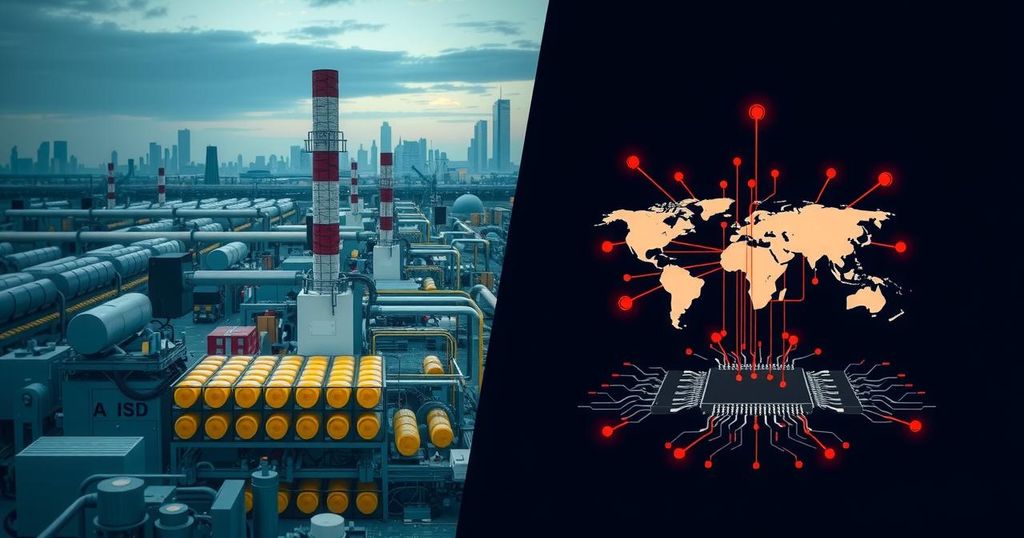Shreya Life Sciences, based in Mumbai, has sparked controversy for exporting advanced technology to Russia amidst Western sanctions. The company shipped over 1,100 Dell servers equipped with high-end AI processors to Russian firms valued at $300 million. As India becomes a crucial intermediary supplier for restricted technology to Russia, international authorities are concerned about the implications for military applications and the ongoing geopolitical tensions surrounding this trade.
Shreya Life Sciences, a seemingly ordinary pharmaceutical company based in Mumbai, has become entangled in a complex export relationship with Russia, drawing the attention of the United States and European authorities. Between April and August of this year, Shreya shipped 1,111 advanced Dell servers, particularly the PowerEdge XE9680, which house high-performance Nvidia and AMD processors designed for artificial intelligence applications. Notably, shipments have continued, despite U.S. and European Union restrictions on dual-use technologies that could benefit Russia’s military sector, accumulating a total value of $300 million. This situation highlights the challenges Western governments face in restricting Russia’s access to sensitive technologies, especially as India emerges as a significant intermediary supplier. According to Bloomberg, India has become the second-largest source of restricted technology for Russia, trailing only behind China. Ukrainian officials have expressed their concerns regarding the continual flow of electronic warfare components to Russia amidst sanctions, emphasizing that profit should not come at the cost of human life in Ukraine. Intriguingly, while Shreya Life Sciences is recognized as a distributor, the shipments are being traced back to Malaysia, where Prime Minister Anwar Ibrahim recently engaged with President Putin to explore enhancing trade ties, including advanced technologies. Research has revealed that a substantial quantity of the Dell servers shipped to Russia originated in Malaysia, raising suspicions about the origin of these exports. Dell, Nvidia, and AMD have stated their commitment to adhering to sanctions and ensuring compliance with export controls. Dell has ceased all product offerings and support for Russia since February 2022, following the invasion of Ukraine. Nonetheless, under existing Indian law, engaging in trade with Russia remains legal, as the Indian government has not participated in sanctions imposed by Western nations, thereby allowing firms like Shreya to continue their business ventures. Western officials have actively engaged with the Indian government, urging them to take action regarding these shipments, conveying growing impatience with India’s role in Russia’s military-related technology trade. The U.S. Treasury Department has highlighted potential sanctions against foreign entities trading with the Russian military. Reports indicate increased transshipments of military-related goods via India as Russia accumulates substantial revenues from oil sales, underscoring the complexities of this issue. Shreya Life Sciences originally operated primarily as a pharmaceutical distributor but gradually expanded into technology exports, raising alarms regarding compliance with international guidelines. The company has faced financial difficulties in the past, primarily due to dependence on Russian markets, which faced sanctions following Crimea’s annexation in 2014. Despite previous operational hurdles, Shreya managed to attain profitability once more, aided significantly by Promsvyazbank in Russia, known for its ties to the defense industry and recent sanctions. Financial records showed that Shreya relied heavily on this Russian bank for capital, allowing it to maintain its business activities effectively. The trajectory of Shreya’s exports turned towards technology in 2022, correlating with the rise of its dealings with specific Russian companies subsequently placed on the sanctions list. The surge in exports occurred around a significant increase in demand for advanced servers destined for Russian companies. The situation raises critical questions regarding accountability and the intricacies of international trade regulations in the context of geopolitical tensions, highlighting the continued struggle between economic interests and the enforcement of compliance with sanctions.
The article discusses the activities of Shreya Life Sciences, a Mumbai-based pharmaceutical company, that has engaged in the export of high-tech equipment to Russia amidst ongoing international sanctions. It outlines the complexities surrounding this trade, particularly the nature of dual-use technology that could potentially serve military purposes. The involvement of multiple countries in this trade, especially Malaysia as a point of origin, is crucial to understanding the broader implications and the geopolitical dynamics at play. The article emphasizes the challenges faced by Western governments in curtailing these exchanges and the implications for India’s role as an intermediary supplier.
Shreya Life Sciences has emerged as a central player in an intricate network of technology exports to Russia, despite the presence of international sanctions aimed at restricting such supplies. As India continues to facilitate these transactions, it poses significant challenges to global efforts to curtail Russia’s military capabilities. The ongoing trade dynamics highlight not only India’s position in global markets but also the complexities surrounding compliance with international sanctions in a rapidly changing geopolitical landscape.
Original Source: www.business-standard.com

Leave a Reply